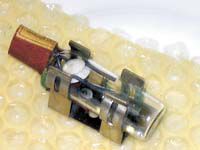| Older electrical switches often contain mercury. Utah Department of Environmental Quality and local health departments have teamed up to provide a way to safely dispose of products containing mercury. |
As Carbon County residents begin spring cleaning projects, the Utah Department of Environmental Quality and the state department of health remind people to be take advantage of free mercury disposal.
The DEQ has teamed up with local health departments across the state to provide opportunities for residents to get rid of products containing mercury.
“We live in an area where liquid mercury has been collected and is being stored in a variety of places. We frequently hear of people cleaning out sheds, garages or basements only to discover a container with mercury in it. Mercury is also in old thermometers, thermostats and old chemistry sets,” said Terrie Wright, emergency response coordinator at the Southeastern Utah Health District’s Price office.
Additionally, Castle Valley coal mines historically use mercury in many electrical switches and other electrical equipment.
The nervous system is very sensitive to all forms of mercury, according to a fact sheet released by the United States Department of Health and Human Services.
Individuals who are exposed to high levels of mercury can damage the brain, kidneys and a developing fetus.
Exposed individuals whose brains have been affected often exhibit irritability, shyness, tremors, changes in vision or hearing and memory problems.
Because of the neurological affects on developing individuals, children and pregnant women are particularly susceptible to the effects of mercury exposure.
Short term exposure to mercury vapors can cause lung damage, nausea, vomiting, diarrhea, increases in blood pressure or heart rate, skin rashes and eye irritation.
“Keeping mercury around your home isn’t illegal – it’s just not a good idea. It not only creates a huge risk for those individuals where it’s stored, but also for firemen or other first responders,” pointed out Wright.
The public health department’s emergency response coordinator explained that, in Carbon County where homes may stay in a family for generations, individuals may discover mercury stored in sheds and houses.
Instructions for safe mercury disposal•Call the health department officials at (435) 637-3671 before bringing mercury to the health department. The district office in Price has been designated as a disposal site for all of southeast Utah by the Utah Department of Environmental Quality. |
The chemical may have been there for years, having been stored by a former owner or resident.
Last year, DEQ and local health departments started a mercury disposal program at selected locations where white plastic five-gallon buckets marked for hazardous waste disposal are situated.
In 2007, the buckets have been provided courtesy of Veolia Environmental.
“A total of 375 pounds of mercury was collected between April and October last year. The tremendous success has prompted many local health departments to offer this service year round,” said Sonja Wallace, pollution coordinator for DEQ.
Wallace added that landfills are not the proper location for mercury disposal.
Wright explained that the SEUHD is accepting mercury for a limited time and advised residents to call the health department for details on how to handle and transport items containing the chemical.
The mercury disposal service at the public health department in Price is for residents of Carbon, Emery, San Juan and Grand counties, pointed out Wright.
Businesses needing mercury disposal should contact an authorized disposal agency. Residents of other areas in the state should contact the DEQ’s regional disposal facility.
In addition, Wright said many local health departments offer an exchange program for residents to bring in older mercury thermometers and receive newer digital models.
In some cases, residents may not discover mercury until it has been spilled. Residents should not use a vacuum cleaner or broom for cleanup.
The DEQ’s Web site provides instructions for proper cleanup and disposal at http://www.deq.utah.gov/Issues/Mercury/spills.

